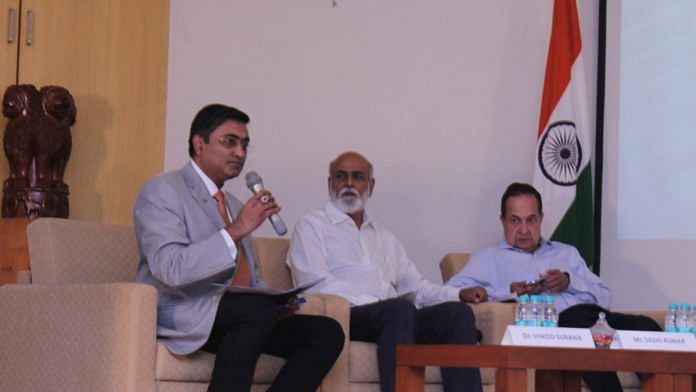Chennai: The “long tail of social media” — not the “big press” — is where democracy will continue to thrive, Sashi Kumar, chairman of the Asian College of Journalism (ACJ) and the Media Development Foundation, said Saturday. He was speaking at ‘The Future of Expression’, a discussion organised by the Chennai-based law firm Surana & Surana International Attorneys and the ACJ.
Among those who spoke at the event were N. Ram, director of The Hindu Publishing Group, and Arun Ram, resident editor of The Times of India, Tamil Nadu editions.
“It is the long tail of social media, not the big press, not the concentration of the power of the press, where democracy will continue to thrive, continue to question, continue to rebel, continue to fight for the core rights of expression of individuals, of citizens. Therein lies the hope for democracy and the future of the media,” Sashi Kumar said.
He went on to contrast speech that “defends” and speech that “incites hatred in society”.
“In many ways, constitutional provisions of freedom of speech and expression have been made redundant and this is one of the big problems of our time. That is the difficult nature of Indian democracy today,” he said.
He added that “freedom of speech and expression, constitutional rights of free speech, the role of the press continue to be or are in a fresh stage of peril or crisis”.
“Irrespective of who has the power, whether it is the Congress or the BJP, politically, in a political lens, you see a repetition of the same process, the same mindset, the same proclivity to suppress the press, to contain the press, which is why I think the First Amendment of the Constitution has actually done us huge injustice because it takes away the right which could have been prescribed in the Constitution, which makes such a huge difference,” Kumar said.
The First Amendment to the Constitution of India, enacted in 1951, among other things introduced the provisions that allow the government to impose “reasonable restrictions” on freedom of speech.
Absolute independence of press ‘a useful myth’
N. Ram, director of The Hindu Publishing Group, also spoke at the same event on the theme ‘freedom of speech, right to expression, and citizen’s rights’.
“Freedom of speech is said to protect, be integral to individual autonomy by allowing individuals to form their own opinions, about their beliefs and actions by enabling self-development, because respecting freedom of speech accords dignity, equal concern and respect due to all individuals,” he said.
Speaking during a panel discussion on evolving journalistic standards, he said: “This business about the fourth estate standing independently is largely a myth, a useful myth since it gives you some protection. When I say myth, it relates to absolute independence.”
“One safeguard or relative safeguard against these pressures is professional practice and ethics,” he added.
Also a participant in the panel discussion was Arun Ram, resident editor of The Times of India, Tamil Nadu editions.
“We all know that all media houses are under pressure from governments. It has always been so, only that the new dispensation is more assertive and interfering,” Arun Ram said.
“What we need to do is keep on being good journalists, which means you will always be in a position of power, strength. We keep on doing, we just do it tactfully, never stop doing, the way in which we do it,” he added.
Freedom of expression is vital for every progressive society, said Vinod Surana, managing partner, Surana & Surana International Attorneys.
“The right to expression is the most important right in any democracy. In the past 20 years, freedom of expression has evolved and spread rapidly, fuelled by technology and globalization,” Surana said.
Tarun Katial, founder and CEO of Eve World, an online social platform for women, along with N. Surya Senthil, head of IP litigation, media & cyber law practice at Surana & Surana, also spoke at the event.
(Edited by Amrtansh Arora)
Also Read: On World Press Freedom Day, India’s ranking falls again to 150th out of 180 countries



